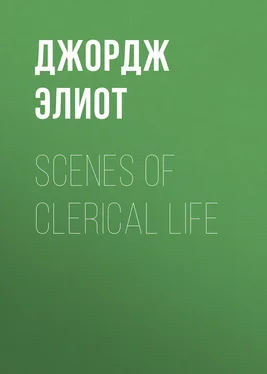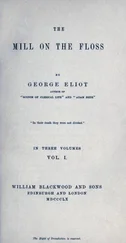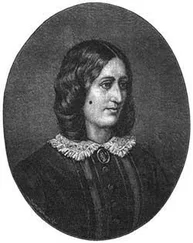Джордж Элиот - Scenes of Clerical Life
Здесь есть возможность читать онлайн «Джордж Элиот - Scenes of Clerical Life» — ознакомительный отрывок электронной книги совершенно бесплатно, а после прочтения отрывка купить полную версию. В некоторых случаях можно слушать аудио, скачать через торрент в формате fb2 и присутствует краткое содержание. Жанр: foreign_antique, Религиозная литература, foreign_religion, на английском языке. Описание произведения, (предисловие) а так же отзывы посетителей доступны на портале библиотеки ЛибКат.
- Название:Scenes of Clerical Life
- Автор:
- Жанр:
- Год:неизвестен
- ISBN:нет данных
- Рейтинг книги:5 / 5. Голосов: 1
-
Избранное:Добавить в избранное
- Отзывы:
-
Ваша оценка:
- 100
- 1
- 2
- 3
- 4
- 5
Scenes of Clerical Life: краткое содержание, описание и аннотация
Предлагаем к чтению аннотацию, описание, краткое содержание или предисловие (зависит от того, что написал сам автор книги «Scenes of Clerical Life»). Если вы не нашли необходимую информацию о книге — напишите в комментариях, мы постараемся отыскать её.
Scenes of Clerical Life — читать онлайн ознакомительный отрывок
Ниже представлен текст книги, разбитый по страницам. Система сохранения места последней прочитанной страницы, позволяет с удобством читать онлайн бесплатно книгу «Scenes of Clerical Life», без необходимости каждый раз заново искать на чём Вы остановились. Поставьте закладку, и сможете в любой момент перейти на страницу, на которой закончили чтение.
Интервал:
Закладка:
George Eliot
Scenes of Clerical Life
INTRODUCTION
George Eliot, or Mary Ann Evans, was born at Arbury Farm, in the parish of Chilvers Coton, Warwickshire, on the 22nd of November, 1819. She was the fifth and last child of her father by his second wife—of that father whose sound sense and integrity she so keenly appreciated, and who was to a certain extent the original of her famous characters of Adam Bede and Caleb Garth.
Both during and after her schooldays George Eliot's history was that of a mind continually out-growing its conditions. She became an excellent housewife and a devoted daughter, but her nature was too large for so cramped a life. 'You may try,' she writes in Daniel Deronda, 'but you can never imagine what it is to have a man's force of genius in you, and to suffer the slavery of being a girl.'
While her powers were growing she necessarily passed through many phases. She became deeply religious, and wrote poetry, pious and sweet, fair of its kind. Music was a passion with her; in a characteristic letter written at the age of twenty to a friend she tries but fails to describe her experience on hearing the 'Messiah' of Birmingham: 'With a stupid, drowsy sensation, produced by standing sentinel over damson cheese and a warm stove, I cannot do better than ask you to read, if accessible, Wordsworth's short poem on the "Power of Sound."' There you have a concise history of George Eliot's life at this period, divided as it was between music, literature, and damson cheese.
Sixteen years of mental work and effort then lay between her and her first achievement; years during which she read industriously and thought more than she read. The classics, French, German, and Italian literature, she laid them all under contribution. She had besides the art of fortunate friendship: her mind naturally chose out the greater intelligences among those she encountered; it was through a warm and enduring friendship with Herbert Spencer that she met at last with George Henry Lewes whose wife she became.
In this way she served no trifling apprenticeship. Natural genius, experience of life, culture, and great companionship had joined to make her what she was, a philosopher both natural and developed; and, what is more rare, a philosopher with a sense of humour and a perception of the dramatic. Thus when her chance came she was fully equipped to meet it.
It came when, at the age of thirty-six she began to write 'Amos Barton,' her first attempt at fiction, and one that fixed her career. The story appeared in 'Blackwood's Magazine,' and was followed by 'Mr. Gilfil's Love Story' and 'Janet's Repentance.' Of the three, 'Mr. Gilfil's Love Story' is perhaps the most finished and artistic; while 'Amos Barton' has qualities of humour and tenderness that have not often been equalled. 'Janet's Repentance,' strong though it is, and containing the remarkable sketch of Mr. Tryan, is perhaps less surely attractive.
The stories, all three of them, have a particular value as records of an English country life that is rapidly passing away. Moreover, it is country life seen through the medium of a powerful and right-judging personality. It is her intimate and thorough knowledge of big things and small, of literature and damson cheese, enabling her and us to see all round her characters, that provides these characters with their ample background of light and shade.
It is well to realise that since George Eliot's day the fashion of writing, the temper of the modern mind, are quite changed; it is a curious fact that the more sophisticated we become the simpler grows our speech. Nowadays we talk as nearly as we may in words of one syllable. Our style is stripped more and more of its Latinity. Our writers are more and more in love with French methods—with the delicate clearness of short phrases in which every word tells; with the rejection of all intellectual ambulations round about a subject. To the fanatics of this modern method the style of George Eliot appears strange, impossible. It does not occur to them that her method has virtues which lack to theirs. They may give us a little laboured masterpiece of art in which the vital principle is wanting. George Eliot was great because she gave us passages from life as it was lived in her day which will be vital so long as they are sympathetically read.
George Eliot can be simple enough when she goes straight forward with her narrative, as, for instance, in the scene of Milly Barton's death; then her English is clear and sweet for she writes from the heart. But take the opening chapter of the same story, and then you find her philosophical Latinity in full swing: the curious and interesting thing being that this otherwise ponderous work, which is quite of a sort to alarm a Frenchman, is entirely suffused by humour, and enshrines moreover the most charming character studies.
These lively and acute portraits drawn from English country life give its abiding value to George Eliot's work. Take the character of Mr. Pilgrim the doctor who 'is never so comfortable as when relaxing his professional legs in one of those excellent farmhouses where the mice are sleek and the mistress sickly;' or of Mrs. Hackit, 'a thin woman with a chronic liver complaint which would have secured her Mr. Pilgrim's entire regard and unreserved good word, even if he had not been in awe of her tongue.'
Or take Mrs. Patten, 'a pretty little old woman of eighty, with a close cap and tiny flat white curls round her face,' whose function is 'quiescence in an easy-chair under the sense of compound interest gradually accumulating,' and who 'does her malevolence gently;' or Mr. Hackit, a shrewd, substantial man, 'who was fond of soothing the acerbities of the feminine mind by a jocose compliment.' Where but in George Eliot would you get a tea-party described with such charming acceptance of whim?
George Eliot wrote poems at various times which showed she never could have won fame as a poet; but there are moments of her prose that prove she shared at times the poet's vision. Such a moment is that when the half broken-hearted little Catarina looks out on a windy night landscape lit by moonlight: 'The trees are harassed by that tossing motion when they would like to be at rest; the shivering grass makes her quake with sympathetic cold; the willows by the pool, bent low and white under that invisible harshness , seem agitated and helpless like herself.' The italicised sentence represents the high-water mark of George Eliot's prose; that passage alone should vindicate her imaginative power.
G. R.
THE SAD FORTUNES OF THE REV. AMOS BARTON
Chapter 1
Shepperton Church was a very different-looking building five-and-twenty years ago. To be sure, its substantial stone tower looks at you through its intelligent eye, the clock, with the friendly expression of former days; but in everything else what changes! Now there is a wide span of slated roof flanking the old steeple; the windows are tall and symmetrical; the outer doors are resplendent with oak-graining, the inner doors reverentially noiseless with a garment of red baize; and the walls, you are convinced, no lichen will ever again effect a settlement on—they are smooth and innutrient as the summit of the Rev. Amos Barton's head, after ten years of baldness and supererogatory soap. Pass through the baize doors and you will see the nave filled with well-shaped benches, understood to be free seats; while in certain eligible corners, less directly under the fire of the clergyman's eye, there are pews reserved for the Shepperton gentility. Ample galleries are supported on iron pillars, and in one of them stands the crowning glory, the very clasp or aigrette of Shepperton church-adornment—namely, an organ, not very much out of repair, on which a collector of small rents, differentiated by the force of circumstances into an organist, will accompany the alacrity of your departure after the blessing, by a sacred minuet or an easy 'Gloria'.
Читать дальшеИнтервал:
Закладка:
Похожие книги на «Scenes of Clerical Life»
Представляем Вашему вниманию похожие книги на «Scenes of Clerical Life» списком для выбора. Мы отобрали схожую по названию и смыслу литературу в надежде предоставить читателям больше вариантов отыскать новые, интересные, ещё непрочитанные произведения.
Обсуждение, отзывы о книге «Scenes of Clerical Life» и просто собственные мнения читателей. Оставьте ваши комментарии, напишите, что Вы думаете о произведении, его смысле или главных героях. Укажите что конкретно понравилось, а что нет, и почему Вы так считаете.










